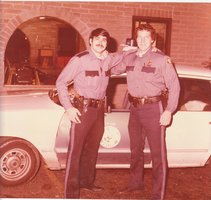How to Become a Police Detective

If anyone is an expert on law enforcement, it is C.W. Jensen. During his impressive 22-year law enforcement career, he held numerous positions, including lieutenant, captain, patrol officer, hostage negotiator, public information officer, and plainclothes street crime officer. He also worked as a detective for property crimes, homicide, internal affairs, and hate crimes. C.W. has been interviewed by the national news as a law enforcement expert, and he regularly appears on the Nancy Grace show to discuss criminal cases. You might recognize him from his multiple guest appearances on World’s Scariest Police Chases, as well as the Maury Povich show, where he discussed police videos. He also appeared on four seasons of World’s Wildest Police Videos. Although he is retired from the police bureau, C.W. currently volunteers as a law enforcement expert for the Humane Society of the United States, assisting their animal cruelty division.
Why did you decide to enter the field of law enforcement?
I was going to college to become a teacher, but I had always had an interest to be a police officer. When I was 21, I took the police entrance test and several months later, I was hired by the police bureau.
Are there common misconceptions about your profession?
Of course. I think most people have heard the stereotypes about people who work in law enforcement. People often think that cops are dumb, uncaring, violent people who only want to arrest people. In fact, officers are hurt and killed every year trying to protect strangers. They deal with tragedy frequently and always look out for the people that society has discarded. And cops are not dumb; many officers have college educations.
What is a typical day like for you?
I don’t think there is a typical day. In the law enforcement field, every assignment has different pressures and different tasks that need to be done. I have done so many different things that I could write a book.
A police officer responds to calls for service. That could be anything from shots fired to a cold theft report. Detectives do follow-up on crime reports or crimes. They are responsible for dealing with serious crime that needs additional investigation like homicide, sex crimes, robbery, etc.
What are your favorite aspects of working in the law enforcement field?
I think the best part of being a cop is knowing that you are making a difference. Without the police, society would collapse. I also enjoy the sense of camaraderie; you love your coworkers and would give your life to save them.
What are your least favorite aspects of your job?
We have to deal with tragedy, and many times be the bearer of bad news. For example, I killed a robbery suspect, and that was tough. I also arrested the first criminal to be executed in the state in 30 years. It is a difficult job sometimes and it can make you so sad.
What classes did you take in college that are the most relevant to your work?
None, and that is important. A student shouldn’t focus on becoming a cop. He or she should focus on being an educated person.
What personality traits do you think would help someone to be successful as a law enforcement professional?
It varies. There is no perfect personality. There is no perfect cop. In general, a nice person makes a nice cop.
What personality traits do you think might hinder someone's success as a law enforcement professional?
Being overzealous and wanting it too badly will certainly hinder someone’s success. Also, trying to be tough. Good cops are good people that choose a tough career.
What advice, or words of caution, would you give to a student who is considering studying to enter the law enforcement field?
If you want to work in law enforcement, don’t study criminal justice. Get a degree in anything besides criminal justice. Get a degree where you had to learn something interesting and you will succeed. The last person I would hire is someone who was a police cadet and then went to college for a criminal justice degree. Please, show me you care about something besides police work. Be able to discuss history, art, philosophy, anything outside of the law enforcement field.
I would tell anyone who is considering a career in law enforcement that it can be an awesome job. But no one leaves without scars, both physically and mentally.